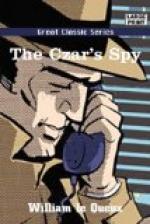“I don’t understand you,” I said. “You are so mysterious, and yet you will tell me nothing!”
“The police, fools that they are, have allowed them to escape, and they will never be caught now. Ah! you don’t know them as I do! They are the cleverest pair in all Europe. And they have the audacity to call their craft the Lola—the Lola, of all names!”
“But as you know who and what the fellows are, you ought, I think, in common justice to Hutcheson, to tell us something,” I complained. “If they are adventurers, they ought to be traced.”
“What can I do—a prisoner here on board?” he argued bitterly. “How can I act?”
“Leave it all to me. I’m free to travel after them, and find out the truth if only you will tell me what you know concerning them,” I said eagerly.
“Gordon, let me be frank and open with you, my dear old fellow. I would tell you everything—everything—if I dared. But I cannot—you understand!” And his final words seemed to choke him.
I stood before him, open-mouthed in astonishment.
“You really mean—well, that you are in fear of them—eh?” I whispered.
He nodded slowly in the affirmative, adding: “To tell you the truth would be to bring upon myself a swift, relentless vengeance that would overwhelm and crush me. Ah! my dear fellow, you do not know—you cannot dream—what brought those desperate men into this port. I can guess—I can guess only too well—but I can only tell you that if you ever do discover the terrible truth—which I fear is unlikely—you will solve one of the strangest and most remarkable mysteries of modern times.”
“What does the mystery concern?” I asked, in breathless eagerness.
“It concerns a woman.”
CHAPTER III
THE HOUSE “OVER THE WATER”
The Mediterranean Squadron, that magnificent display of naval force that is the guarantee of peace in Europe, after a week of gay festivities in Leghorn, had sailed for Gaeta, while I, glad to escape from the glaring heat, found myself back once more in dear old London.
One passes one’s time in the south well enough in winter, but after a year even the most ardent lover of Italy longs to return to his own people, be it ever for so brief a space. Exile for a whole year in any continental town is exile indeed; therefore, although I lived in Italy for choice, I, like so many other Englishmen, always managed to spend a month or two in summer in our temperate if much maligned climate.
London, the same dear, dusty old London, only perhaps more dear and more dusty than ever, was my native city; hence I always spent a few weeks in it, even though all the world might be absent in the country, or at the seaside.
I had idled away a pleasant month up in Buxton, and from there had gone north to the Lakes, and it was one hot evening in mid-August that I found myself again in London, crossing St. James’s Square from the Sports Club, where I had dined, walking towards Pall Mall. Darkness had just fallen, and there was that stifling oppression in the air that fore-tokened a thunderstorm. The club was not gay with life and merriment as it is in the season, for everyone was away, many of the rooms were closed for re-decoration, and most of the furniture swathed in linen.




